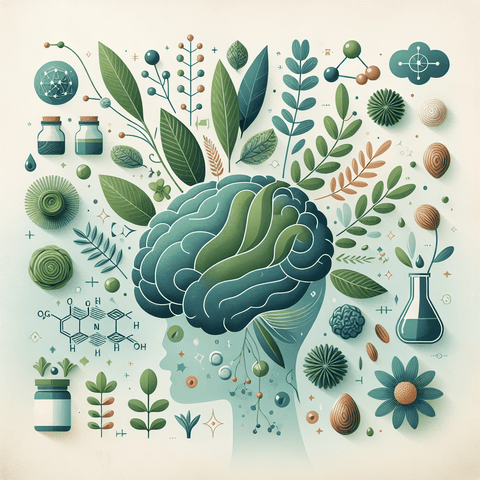Enhancing your brain power naturally is an increasingly popular pursuit in our health-conscious society. As we recognize the vital role that cognitive function plays in everyday life, from professional success to personal wellbeing, many seek effective ways to boost their mental performance. Brain health encompasses memory, focus, clarity, resilience to mental fatigue, and overall neurocognitive vitality. While there is a plethora of marketed supplements promising rapid results, much of the mainstream focus often remains on popular ingredients like ginkgo biloba, caffeine, or generic multivitamins. However, recent research highlights a host of lesser-known, overlooked natural supplements that can support and optimize brain function without adverse side effects. This comprehensive guide aims to uncover these hidden gems, providing you with evidence-based insights to aid your pursuit of mental excellence naturally and sustainably.
Brain Supplements: Unlocking the Potential of Nutritional Approaches for Cognitive Enhancement
Within the broad landscape of nutritional health, brain supplements occupy a specialized niche aimed at nurturing cognitive function through targeted nutritional support. Defined generally as products formulated to promote cognitive health, they consist of vitamins, minerals, herbs, amino acids, and other bioactive compounds. Supported by advances in neuroscience and nutritional science, these supplements seek to optimize processes such as neuroprotection—the safeguarding of nerve cells—neuroplasticity—the brain's ability to reorganize itself—and improved blood flow, which supplies essential nutrients and oxygen critical for optimal function.
Many people are familiar with certain antioxidants, like vitamin E or polyphenols, but often overlook specific nutrients integral to brain health, such as phosphatidylserine or choline. Despite their promising roles, these compounds sometimes receive less media attention, yet they harbor significant potential. The key to understanding their effectiveness lies in how they influence neurotransmitter synthesis, cell membrane integrity, and neurogenesis—the creation of new neurons. Moreover, the safety profile of these natural supplements makes them attractive options for those seeking holistic approaches free of synthetic chemicals or pharmaceuticals.
However, not all supplements are created equal. Their efficacy often depends on factors such as quality sourcing, proper dosage, individual biochemistry, and overall lifestyle. Factors like age, genetic predispositions, diet, and existing health conditions influence how well a supplement works and whether it might cause side effects or interactions. Therefore, a nuanced, evidence-based approach is essential, emphasizing natural synergy with a healthy diet, regular exercise, sufficient sleep, and mental challenges. The holistic approach to cognitive health emphasizes consistency, patience, and customization rather than quick fixes, supporting sustainable mental performance Long-term.
Nootropics for Focus: Natural Substances to Sharpen Your Concentration
The quest for improved focus and mental clarity has led many to explore nootropics—substances that potentially enhance cognitive functions such as attention, alertness, and mental stamina. While popular narratives often focus on synthetic options, natural nootropics hold significant promise for those preferring holistic interventions. Among the overlooked natural substances, Rhodiola Rosea, L-Theanine, and Bacopa Monnieri stand out as potent yet underappreciated options.
Rhodiola Rosea, a adaptogenic herb native to cold regions of Europe and Asia, has garnered increasing attention for its ability to combat mental fatigue and stress. Studies suggest that Rhodiola can improve attention, reduce perceived stress, and enhance mental stamina, especially during periods of fatigue or chronic stress. Its mechanism involves modulating neurochemical pathways related to serotonin, dopamine, and norepinephrine, contributing to improved resilience against cognitive wear and tear. Practical usage typically involves a standardized extract at doses ranging from 200 to 400 mg daily, often taken in the morning or before mental tasks to optimize alertness.
L-Theanine, mainly derived from green tea, is renowned for promoting relaxation without sedation, leading to a state of calm alertness. Interestingly, its combination with caffeine yields synergistic benefits—improving focus, reducing jitters, and enhancing cognitive performance. For those seeking a balanced mental state, incorporating L-Theanine (usually 100-200 mg) alongside a moderate amount of caffeine can be a game-changer for sustained concentration during work or study sessions. Scientific evidence supports L-Theanine's role in increasing alpha wave activity, associated with relaxed, focused states, making it an ideal natural nootropic for daily mental tasks.
Bacopa Monnieri, a perennial herb with a long history in traditional Ayurvedic medicine, has been scientifically validated for its role in improving memory, learning, and cognitive flexibility. Its active compounds, bacosides, support neuroplasticity and antioxidant defenses within the brain. Regular supplementation over several weeks has shown to enhance attention span and information retention. Typical dosages range from 300 to 450 mg of standardized extract daily.
Integrating these natural nootropics into daily routines is straightforward. They can be taken as capsules, teas, or powders, and incorporated into morning rituals or pre-work routines. As with any supplement, it's crucial to start with small doses to assess tolerability and consult with healthcare professionals, especially those on medications or with pre-existing health conditions. While individual results vary, many users report increased focus, mental resilience, and less fatigue after consistent use—supporting their role as overlooked yet effective natural focus boosters.
Natural Cognitive Enhancers: Everyday Nutrients That Support Brain Function
Beyond herbal supplements and nootropics, fundamental nutrients present in everyday diets already contribute significantly to cognitive health. However, certain overlooked natural enhancers can be targeted through diet or supplementation to reinforce mental performance, especially when deficiencies are present. For example, omega-3 fatty acids—particularly EPA and DHA—are critical structural components of neuronal membranes, influencing fluidity and receptor function. Research indicates that sufficient levels of omega-3s are associated with better memory, mood, and overall cognitive resilience.
Yet, many individuals do not attain optimal omega-3 levels through diet alone, especially if they do not consume fatty fish regularly. Supplementing with high-quality [[dha-epa-omega-3-supplements](https://www.topvitamine.com/collections/dha-epa-omega-3-supplements)] can bridge this gap effectively. Incorporating these into your routine supports brain cell health, reduces inflammation, and may improve connectivity between neurons.
Phosphatidylserine, a phospholipid found naturally in brain cell membranes, plays a vital role in maintaining membrane fluidity and facilitating cell signaling. Supplementing with phosphatidylserine has shown potential in improving memory and cognitive processing speed, especially among aging populations. Typical doses range from 100 to 300 mg daily.
Choline sources, such as CDP-choline or alpha-GPC, are essential precursors to acetylcholine—a neurotransmitter fundamental for learning and memory. Supplementing choline can support mental clarity, concentration, and mood regulation, particularly in individuals with suboptimal dietary intake. Ensuring adequate B-vitamins—like B6, B9 (folate), and B12—is also critical, as deficiencies can impair cognitive function and contribute to mental fatigue. Incorporating B-vitamin complexes or foods rich in these nutrients (leafy greens, eggs, fortified cereals) can be a simple yet effective approach.
The importance of balanced nutrition cannot be overstated. Deficiencies in these key nutrients can hinder cognitive performance, so a strategic combination of diet and targeted supplementation may be necessary for optimal brain health. Always consult with a healthcare provider before initiating new supplements, especially if underlying health issues exist. The consistent intake of these natural nutrients, aligned with a healthy lifestyle, provides a solid foundation for sustained mental vitality.
Herbal Brain Boosters: Traditional Plants with Modern Cognitive Benefits
Herbal medicine has a rich history of supporting cognitive health across diverse cultures, with many plants traditionally used to enhance memory, reduce stress, and promote mental clarity. Lesser-known herbs, often overshadowed by ginkgo or ginseng, are gaining attention for their unique properties and scientific backing. Gotu Kola (Centella asiatica), for example, is an herb renowned in Ayurvedic and traditional Chinese medicine for promoting mental alertness, reducing anxiety, and enhancing memory. Its neuroprotective effects are linked to increased antioxidant activity and improved cerebral blood flow.
Ashwagandha (Withania somnifera), another adaptogen, helps mitigate stress-related cognitive decline by modulating cortisol levels and promoting a sense of calm. Clinical studies suggest that ashwagandha supplementation can improve working memory and reaction time, making it a valuable addition to natural cognitive support routines.
Lion’s Mane Mushroom (Hericium erinaceus), a dietary mushroom increasingly popular today, has shown promising evidence in stimulating nerve growth factor (NGF) production—crucial for neurogenesis, learning, and memory. Incorporating Lion’s Mane extracts into daily wellness routines has been associated with increased mental clarity, focus, and neuroprotective benefits. Its bioactive compounds can be consumed as teas, extracts, or capsules, with dosages typically around 500-1000 mg daily.
From a scientific perspective, these herbs exert their effects via neurogenesis, neuroprotection, reducing neuroinflammation, and supporting brain angiogenesis. Their integration into holistic wellness practices complements lifestyle habits like meditation, exercise, and balanced nutrition.
Memory-Boosting Supplements: Natural Aids for Better Recall and Retention
Memory is a core facet of cognitive health, and several natural supplements have been shown to support memory retention, recall, and neuronal vitality. Among these, Acetyl-L-Carnitine (ALC) deserves special mention. As a metabolite involved in mitochondrial energy production, ALC enhances neuronal energy metabolism, thus improving mental alertness and memory. Studies have indicated that ALC supplementation can support age-related cognitive decline and improve verbal fluency. Typical doses range from 500 to 1500 mg daily.
Huperzine A, derived from the Chinese club moss Huperzia serrata, acts as an acetylcholinesterase inhibitor—meaning it prevents the breakdown of acetylcholine, thus increasing its availability. This action supports learning and memory, making huperzine A a popular natural memory booster. Dosing is usually in the range of 50-200 mcg per day, with cycles to mitigate potential side effects.
Vinpocetine, a derivative of the periwinkle plant, enhances cerebral blood flow and supports neuronal energy metabolism. It may aid in improving memory, attention, and processing speed. Its use should be approached cautiously, with a typical dose of 5-10 mg taken two or three times daily.
Complementary lifestyle practices such as mental exercises, adequate sleep, physical activity, and stress management significantly amplify the benefits of these supplements. Before starting any of these products, it’s prudent to consult healthcare providers, especially if there are existing health conditions or medication interactions.
Plant-Based Nootropics: Harnessing Nature’s Bounty for Mental Performance
In recent years, plant-based nootropics are gaining popularity for their safety profiles and holistic benefits. These natural compounds, often derived from traditional medicine systems, can support various aspects of mental performance, including mood stabilization, stress reduction, and cognitive enhancement. Shankhpushpi (Convolvulus pluricaulis), for example, is an Indian traditional herb reputed for improving memory, reducing anxiety, and promoting tranquility. Scientific studies, though limited, support its adaptogenic and nootropic roles.
Brahmi (Bacopa Monnieri), mentioned earlier, further exemplifies plant-based nootropics with robust scientific validation. Its neuroprotective and cognitive-enhancing effects are attributed to modulation of neurotransmitters and antioxidant activity. Sourcing high-quality extracts and ensuring purity is critical for maximizing benefits.
Polygala tenuifolia, another traditional Chinese herb, has demonstrated promising results in supporting memory and learning. Its active compounds may influence cholinergic and serotonergic pathways, contributing to improved cognitive resilience.
Quality sourcing, organic extraction methods, and sustainable harvesting practices ensure the efficacy and safety of plant-based nootropics. Incorporating these herbs into teas, tinctures, or capsules aligns with a health-conscious, plant-based lifestyle, supporting natural mental performance without reliance on synthetic pharmaceuticals.
Conclusion
Natural, overlooked supplements offer a promising avenue to boost brain power safely and sustainably. From lesser-known herbs like Gotu Kola and Lion’s Mane to essential nutrients such as omega-3 fatty acids, phosphatidylserine, and choline sources, these options provide targeted support for various cognitive functions. In addition, natural nootropics like Rhodiola and L-Theanine can help sharpen focus and reduce mental fatigue, while plant-based formulations bring traditional wisdom into modern practice. Embracing an integrative approach that combines these supplements with a balanced diet, regular exercise, mental challenges, and sufficient sleep paves the way for lasting cognitive vitality.
Always remember to consult healthcare professionals before integrating new supplements into your routine, particularly if you are on medication or have underlying health concerns. Responsible, informed use of these natural allies can help you unlock your mental potential and enjoy a sharper, more resilient mind for years to come.
Q&A Section
Q: Are overlooked natural supplements safe to use regularly?
A: Most natural supplements, when sourced from reputable brands and used within recommended doses, are considered safe for regular use. However, individual responses vary, and it is essential to consult with healthcare professionals, especially if you are pregnant, nursing, or taking medications.
Q: Can these natural supplements replace prescription nootropics or medications?
A: Natural supplements can support cognitive health and may enhance mental performance, but they should not be seen as substitutes for prescribed medications or treatments. Always discuss specific health needs with your healthcare provider.
Q: How long does it take to notice improvement in cognitive function using these supplements?
A: The timeline varies depending on the supplement, dosage, and individual factors. Some herbs like Bacopa may require 4-8 weeks of consistent use, while others like L-Theanine can provide immediate calming effects. Patience and consistency are key to achieving benefits.
Q: Are there any side effects associated with these overlooked supplements?
A: While generally well-tolerated, some supplements can cause side effects such as gastrointestinal discomfort, allergic reactions, or interactions with medications. Monitoring your response and consulting a healthcare provider helps mitigate risks.
Q: How should I incorporate these overlooked supplements into my daily routine?
A: Start with low doses, observe your response, and gradually increase as needed. Combining them with a healthy diet, physical activity, mental exercises, and good sleep practices maximizes their effectiveness. Consistency is vital for noticeable benefits.
Important Keywords
- Natural brain supplements
- Overlooked nootropics
- Herbal cognitive enhancers
- Memory-boosting supplements
- Focus and concentration herbs
- Plant-based nootropics
- Omega-3 DHA EPA supplements
- Choline sources for brain health
- Holistic cognitive support
- Neuroprotective natural compounds



